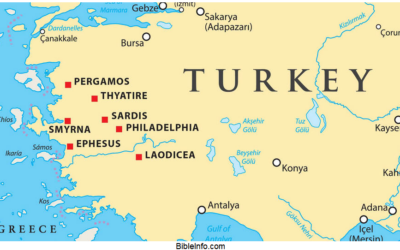The word “abba” is an Aramaic word for “father.” It is used in several places in the New Testament as a title for God (transliterated into Greek letters but left as an Aramaic word), though always paired with the Greek word for Father, “pater.”
Though you will often hear the claim repeated, especially among modern evangelicals, the word “abba” is not actually an equivalent of the English “daddy.” While abba referred to the familial relationship of fatherhood, it was in no way childlike and was used by adults to address their parents throughout life and without any sense of immaturity.1 Ancient Jews or Christians addressing God as “Abba” would not have viewed themselves as little infants expressing mere childlike affection for their “daddy.” For example, When the early Church writer Origen (who, though a Greek, was also fluent in Hebrew and Aramaic) read Paul’s words in Galatians 4:6 that we are adopted as sons and given the Spirit of adoption which cries out “Abba, Father,” he did not find in these terms the idea of the tenderness and gentle affection for a toddler but rather the bold empowerment bestowed on a kingly heir who is sent forth as an ambassador!2
It should also be noted again that the New Testament authors always paired “Abba” with “Pater,” both meaning “Father.” The Greek does not appear to be offered merely as a translation of the Aramaic, but rather as a part of the title itself. As one scholar notes:
“Pater is not added in order to explain the Aramaic ‘Abba’ for Greek readers. Rather the whole phrase ‘Abba, ho Pater’ had passed into the early Christian prayers.”3
The term “Abba” is used in ancient Jewish writings as an address for God, and some scholars have theorized that the emphatic repetition of “Father” in both Aramaic and Greek may have been a liturgical formula first used among Hellenistic Jews (Greek-speaking Jews living outside of Israel throughout the Greco-Roman world.)4 In the book of Acts, we see Paul’s missionary work often began in these Hellenistic Jewish synagogues, and it would not be surprising for the early churches to have utilized certain vocabulary common in such communities. We do know that combining Greek and Hebrew or Aramaic synonyms into a single title was employed in Rabbinic writings,5 and occasionally elsewhere in the New Testament,6 but we do not have any direct evidence of pre-Christian Jewish use of the phrase “Abba, ho Pater” as a title for God.
A more likely explanation is that the New Testament authors created this paired title specifically to reflect God as the Father of both Jews and believing Gentiles alike,7 now brought together as one people and one family through faith in Christ. This is how ancient commentators like Augustine understood it,8 and it makes a great deal of sense in the context. Paul only uses the phrase “Abba, Father” when he is writing about the idea of our adoption in Christ by grace, apart from works of the law and available to both Jews and Gentiles equally, who are made to be children of God.
In the book of Galatians, a book chiefly concerned with refuting the false teaching that Gentile Christians needed to be circumcised and come under the law to be saved, Paul writes:
“So also we, while we were children, were held in bondage under the elemental things of the world. But when the fullness of the time came, God sent forth His Son, born of a woman, born under the Law, so that He might redeem those who were under the Law, that we might receive the adoption as sons. Because you are sons, God has sent forth the Spirit of His Son into our hearts, crying, ‘Abba! Father!’ Therefore you are no longer a slave, but a son; and if a son, then an heir through God,” (Galatians 4:3-7).
First, we see here that calling God “Abba, Father” is a sign of maturity. Being childlike is a negative quality of our past bondage. But there is more. The argument is that the Gentile Christians are no longer slaves and need not come under legalistic bondage. They do not need to be circumcised and become Jews any more than Jews become gentiles, but both are united together and cry out to the God who is Father of both, “Abba, ho Pater.” Father in the language of both Jews and Gentiles! Similarly, Paul writes to the church in Rome:
“So then, brethren, we are under obligation, not to the flesh, to live according to the flesh— for if you are living according to the flesh, you must die; but if by the Spirit you are putting to death the deeds of the body, you will live. For all who are being led by the Spirit of God, these are sons of God. For you have not received a spirit of slavery leading to fear again, but you have received a spirit of adoption as sons by which we cry out, ‘Abba! Father!’ The Spirit Himself testifies with our spirit that we are children of God, and if children, heirs also, heirs of God and fellow heirs with Christ, if indeed we suffer with Him so that we may also be glorified with Him,” (Romans 8:12-17).
The Spirit makes us all God’s children and equally joint-heirs in Him through adoption. We are not under law but are called to live up to the dignity of the status that is granted to all by faith, both Jew and Greek alike. This seems to be the special point of the title “Abba, Father” used in such contexts.
References
| 1↑ | Richard Bauckham, Jesus: A Short Introduction (Oxford Press, 2011) 65 |
|---|---|
| 2↑ | Origen, Against Celsus, Book 8, Chapter 6 |
| 3↑ | Marvin R. Vincent, Vincent’s Word Studies of the New Testament, Vol. 4 (Macdonald Publishing Company, 1887) 138 |
| 4↑ | ibid, Vol. 3, 91-92 |
| 5↑ | ibid, Vol. 4 138 |
| 6↑ | Such as in Revelation 12:9, where our spiritual adversary is given the dual name “the Devil and Satan,” or “Diabolos” (Greek) and “Satanas” (Aramaic derivation of the Hebrew ‘satan’). The words are synonyms, both meaning “adversary,” and are combined as the title of our ultimate spiritual enemy. |
| 7↑ | Marvin R. Vincent, Vincent’s Word Studies of the New Testament, Vol. 3 (Macdonald Publishing Company, 1887) 92 |
| 8↑ | See, for example, Augustine, The Harmony of the Gospels, Book 3, Chapter 4, Section 14; A Treatise on the Spirit and the Letter, Chapter 56 |






